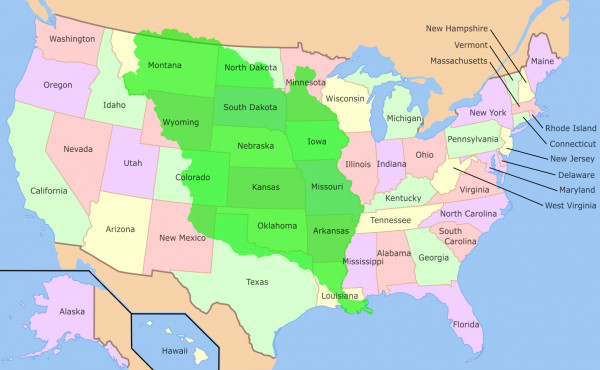
In the agreement with France, signed on April 30, 1803, the United States purchased 2,144,510 square kilometers of land west of the Mississippi River for $15 million. For about one cent an acre, the United States doubled in size, and the country expanded westward.
Specifically, the area purchased included the present-day states of Arkansas, Missouri, Iowa, and Oklahoma, parts of Minnesota west of the Mississippi River, most of North Dakota and South Dakota, northeastern New Mexico, northern Texas, part of Montana, Colorado, and Wyoming east of the Continental Divide, Louisiana west of the Mississippi River including New York City. Orleans as well as parts of the lands that were later (after the Anglo-American War of 1812) incorporated into the Canadian provinces of Alberta and Saskatchewan.
Taking advantage of American commerce through New Orleans
In October 1802, King Charles IV of Spain signed the royal decree transferring the territory to France, and the Spanish governor of New Orleans Morales terminated the American right to bring goods into the city duty-free. He argued that the three-year term of the 1795 treaty that granted America this right and free passage through Spanish territory on the Mississippi River had expired.
The secret Treaty of Saint-Ildevon, which Napoleon had negotiated with Charles IV, required the return of the territory to France. When Jefferson heard rumors of Napoleon’s secret pact, he immediately saw the threat to the United States’ then-western settlements and its vital access to the Gulf of Mexico. Jefferson suspected that Napoleon wanted to close the Mississippi River for American use.
As a result, poachers’ furs and agricultural and manufactured goods were in danger of being scuttled and pilfered on the open docks awaiting shipment to the East Coast and beyond. The entire economy of the American western regions was in danger.
Jefferson wrote in April 1802 to the American minister (and ambassador) in Paris, Robert Livingston, that it was essential that the port of New Orleans remain open and free to American commerce and that he was trying to buy New Orleans.
That same month, Jefferson asked James Monroe to meet Livingston in Paris with an authorization to spend $9,375,000 to purchase New Orleans and parts of Florida. By the time Monroe reached Paris on April 12, Napoleon had suddenly decided to sell the entire territory of Louisiana to the United States. In Napoleon’s view, the land was useful primarily as a granary for the colony of Saint-Domingue (present-day Haiti). but with the danger of the colony being lost to popular rebellion, his lands became “useless”.
At first, the negotiators were allowed to pay the port of New Orleans and Florida alone $10 million. However, when the entirety of Louisiana was offered—an area larger than Great Britain, France, Germany, Italy, Spain, and Portugal combined—American negotiators immediately agreed to a price of $15 million.
America gains new worldviews
Rich in gold, silver and other minerals, as well as endless lands for grazing and farming, the new acquisition made America extremely rich.
Generally a stern interpreter of the Constitution, President Thomas Jefferson questioned whether the United States government (and especially the president) had the authority to acquire new territories, and the desire to expand the United States across the continent overcame ideological inhibitions. When Napoleon Bonaparte threatened to withdraw the offer, Jefferson cleared any doubts he had and prepared to take possession of a region of unimaginable wealth.
The Louisiana Purchase was the first major grant of land in a long series of expansions that stretched back into the nineteenth century.
Each expansion, as the United States greatly increased in size, also exposed the structural differences between the North and the South, especially on the issue of slavery. In addition, the Louisiana market ignored the potential impact on Native Americans. With the creation of territories and states, more and more Americans traveled from east to west, which led to conflict with the Native Americans.
While the importance of the market is widely recognized today, at the time it faced a backlash from Federalists regarding its constitutionality. The Framers of the Constitution did not anticipate such territorial expansion of the United States. President Thomas Jefferson himself was deeply concerned about the market. After a fierce debate, Congress ratified the treaty in 1803 and in turn completely changed the course of the United States.
Historical value
The Louisiana Purchase was historically significant because it gave Jefferson an economic and political victory, asked and answered constitutional questions, helped divide the Union and expand slavery, and contributed to the doom of the Native Americans.
Few circumstances have had a greater impact over the course of US history. Without the lands acquired through the purchase, it is doubtful that the United States would have looked as it does today.
President Theodore Roosevelt commented on the centennial of the purchase:
“The fact that more than any other state, after the formation of government and always with the exception of its maintenance, determines the character of our national life.”
Instead, the Louisiana Purchase also helped highlight divisions within the United States and helped push the nation down the road toward civil war.
Economic and political victory
The main reason why the Louisiana Purchase was so important was how it represented an economic and political victory for Jefferson.
The New Orleans and Louisiana Purchase gave the United States complete control of the Mississippi River. Farmers no longer have to depend on the whims of a foreign country to ensure that their goods and products reach global markets.
Furthermore, the area included in the purchase was vast—so vast, in fact, that it was twice the size of the United States. The land was arable and rich in natural resources – the ideal situation for a country seeking expansion.
In iconic eloquence, Jefferson commented:
“…the fertility of the country, its climate and extent, promise in time great additions to our treasury, abundant provision for our generations, and ample scope for the graces of liberty and laws of equality.”
There were few American/European settlements outside of the Mississippi at the time, with some trappers and trappers involved in the fur trade being the main Euro-American population.
Shortly after the purchase, Jefferson commissioned the Lewis and Clark Expedition to further explore and map the area. Reports brought back by the group fascinated the American nation and sparked further interest in westward expansion.
President Jefferson truly believed that the Louisiana Territory could finally help the United States grow and spread its own meaning of democracy and freedom. He envisioned the Mississippi River bringing the nation together.
The importance of New Orleans’ possession of security against British and French threats to the West cannot be underestimated. France could very reasonably have challenged the United States with a large force stationed at New Orleans.
It intensified the division of the Union and the expansion of slavery
Another important outcome of the Louisiana Purchase was how it helped further divide the Union and expand the institution of slavery.
State tensions were already playing out at the time of the Louisiana Purchase. The bitter election of 1800 highlighted the salient partisan divide, largely along state lines.
New Englanders really hated this huge swathe of land that now lies within the United States. They often complained that available land lowered land prices and raised wages in the East as workers left the West to buy land cheaply.
Northerners generally feared the repercussions of the additional territory for the United States. The new lands would lead to new states and thus a weakening of the political power of the commercial interests of the New England states.
In addition, Northerners in particular feared the expansion of slavery into the new lands. The invention of the cotton gin helped revolutionize the cotton industry and greatly spread cotton plantations in the South.
The fertile lands included in the Louisiana Purchase could easily support the expansion of slavery and thus the political ambitions of the South.
The contentious issue of slavery and what to do with the Louisiana Territory would not be decided until the historic Missouri Compromise of 1820.
It led to the extermination and marginalization of the indigenous population
An often overlooked consequence of the Louisiana Purchase is how it helped drive the extinction of Native Americans across the continent.
As was common at the time, the natives and their wishes were completely ignored during the entire treaty process. Indeed, it is doubtful that any of the indigenous people living in the Louisiana Territory were aware that land “tenure” had changed hands again.
Many Americans at the time believed that the United States was already full of available land east of the Mississippi River. President Jefferson knew that at the rate of new settlers, the land available to the United States would run out within a few generations.
Thus, the Louisiana Purchase was necessary to continue the spread of American democracy across the continent, whether those already living there wanted it or not.
While the Louisiana Territory is often described as a vast, unspoiled land, thousands of Indigenous peoples in hundreds of nations actually live on the land.
As was the case with the lands east of the Mississippi River, the federal government did not concern itself with native lands when handing over cheap plots of land to settlers. The westward movement of tens of thousands of settlers over the next century predictably led to conflict, violence, and war.
Indigenous people either disappeared entirely or signed treaties ceded their lands and were forced to live in camps. However, the federal government violated the treaties.
The United States even used the new lands to forcibly relocate Native American nations from the east, such as the Five Civilized Tribes with the Indian Removal Act of 1830.
Further subjugation by Native Americans left a stain on the all-important Louisiana Purchase.
(Ps. The Louisiana Purchase consists of the assignment agreement and the two agreements relating to the financial aspects of the transaction.)
source: extra time

“Hipster-friendly coffee fanatic. Subtly charming bacon advocate. Friend of animals everywhere.”




More Stories
With missiles and drones they will assassinate Volodymyr Zelensky – what is the plan?
Vladimir Putin was sworn in as president for the fifth time – highlights of his speech
Ukraine says it foiled Russian plot to kill Zelensky – two Ukrainian officials arrested